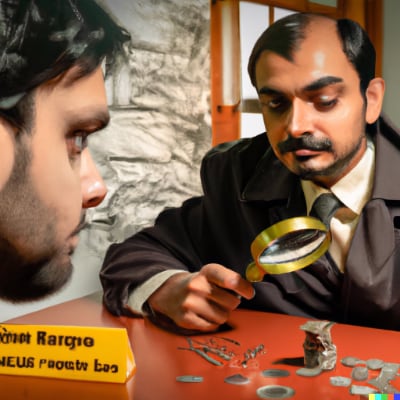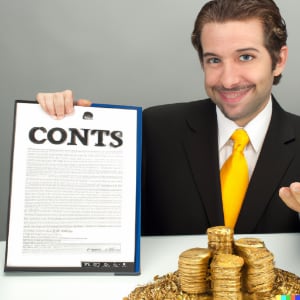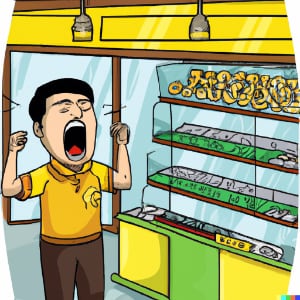Sometimes I Need to Push Back If I Want to Move Forward

One of the things I enjoy about dealing in rare coins for a living is that every day brings with it something new - we could be offered a range of ancient Roman coins in the morning, sell some krugerrands in the afternoon and be asked to appraise some valuable foreign all on the same day.
Working in retail means I'm always dealing with new people, so I'm continually learning new ways work with people as well. My latest revelation is that when I'm dealing with someone for the first time, I often need to push back if I want to move forward without getting a nasty surprise. So what the hell does that even mean?
I Have Some Old Coins, Would You Like To See Them?
I often get asked "I have some old coins, would you like to see them?" People that ask me that think it will lead to what the economist William Stanley Jevons described as "a double coincidence of wants". They believe they'll get to learn about the history and the value of their coins for free, and I'll be happy with the experience of looking at some new coins.
They presume that, for me, the anticipation of looking at a fresh collection of coins is exciting, whereas the reality couldn't be further from the truth. Over 25 years as a professional numismatist, I've appraised many thousands of coin collections and the novelty of looking at the average coin collection wore off around 24 years ago.
The reality is that as much as most vendors like to think me looking at their collection is going to be as rewarding for me as it will be for them, they wouldn't want me as an excited collector babbling endlessly about minor details of their coin collection. What they do want is a clear and thorough assessment - unambiguous advice on what their collection contains and what it's worth.
I Identify And Apprsaise Coins To A Standard An Independent Expert Would Be Satisfied With
Experience has repeatedly shown me that is true, so this is what I commit to doing - if someone with coin or a modest accumulation makes an appointment at our premises, I will identify and appraise their coin collection to a standard that an independent expert would be satisfied with.
Once I make that clear promise and it's accepted, most people can't wait to bring their coins in for an appraisal - they're caught in the grip of the possibilities they envision will come off once they sell.
It's at this point that I've recently learned I need to bring them back down to earth before we get close to meeting up, and let them know there are terms and conditions linked to what I'm prepared to do for them. Experience has also taught me that if I don't pose this delicately, any suggestion of terms and conditions is about as welcome as a prenuptial lawyer at an engagement party.
The reason I even entertain risking the potentially negative consequences of imposing terms on a promising business transaction is that, once done successfully, it exponentially increases the likelihood anything we might do together results in everyone being satisfied with the outcome.
I know full well that the people that approach me for help have no particular concern for my satisfaction, but I do know from lived experience that if they're asked to give something up to ensure I won't act in a self-serving way, they'll do so gladly and will thank me for proposing it.
Delicately Raising the Idea of Terms and Conditions
I'm sure there are delicate ways of raising the notion of terms and conditions, but the way I approach this balloon-popping phase of an appraisal transaction is to say something along the lines of: "Before you get too excited about bringing your coins in, I should let you know there are terms and conditions linked to what I'm prepared to do for you. Would you like to hear what they are?"
I then stop, say nothing, and let the resulting silence do it's work. If they agree to hear me out, I'll let them know "If you choose to sell, you'll walk out with money and hopefully a smile, but if we don't do business for any reason at all, I'll ask you to make a donation to the charity box on our counter."
I find if I say my piece in a level-headed way - without anger; resentment; greed or disdain (emotions I've allowed get to me previously!), they'll respond positively. Cautiously maybe, but positively.
The reason many potential vendors are cautious when they indicate they're prepared to hear me out is because their internal dialogue about how our transaction is going to pan out is incredibly strong.
I know when I'm excited about something, I don't always think things through clearly - I'll leave the fine details for later. Without having given much thought for the person on the other end of the equation of their coins being appraised, many vendors sincerely believe:
- They can turn up for an appraisal whenever they want;
- They'll be attended to by an expert immediately;
- The expert will be delighted to look through their coins and explain all about them in great detail;
- There's a good chance the expert will find something truly rare and valuable; and
- Because they're lucky and the coin dealer is a decent guy, he'll make an exception to his normal business practices and will pay them a strong price for their lucky find.
I know none of those expectations are malicious or even unreasonable, but in the real world of a professional numismatist, they're not realistic to comply with regularly over the long term a business is in operation.
The World Of Finite Resources, Deadlines And Ongoing Commitments
Just like any other business owner, professional coin dealers like me live in a world of finite resources, deadlines and ongoing commitments. I now know in my bones I need to protect the value of my time and expertise, because Lord knows there are plenty of folks out there who will be happy to take both for free if I don't!
Once we've explicitly agreed on the fine points of an appraisal that are important to both of us, you might be forgiven for thinking the confronting work of terms and conditions is done and dusted and all we need to do is to wait for the appointment to get the work done.
Experience has shown me though that it still isn't the time to hang up the phone - if my "close" rate is to remain as high as it is these days, I also need to make sure they have everything they need to hold up their end of our bargain.
If you're wondering what the hell they might need other than our address and the coins they're looking to get appraised, keep in mind that not only do I want them to turn up on time with the items they're looking to get appraised, I also want them to be in a decent mood when they arrive!
Foaming At The Mouth About Parking; One-Way Streets Or Lack Of Signage
For that reason, I've found I need to affirm our exact location and to challenge any naivety they might have about just how easy we are to get to.
There's a delicate line between being helpful with the aim of smoothing someone else's path and mansplaining, so even though I can only do so much to get someone to our front door, I've found it's important to at least offer clear directions to ensure they aren't foaming at the mouth about parking; one-way streets or lack of signage for the first 5 minutes we're together.
Once all of that groundwork (!) has been laid, I can finally relax and say I look forward to seeing them.
The surprising thing for me is that since I've adopted this confronting and candidly boring approach of standing firm on terms before I start work or even give a free valuation, I'm having many, many more genuine conversations with the folks that come and see me. My appraisal to purchase ratio has gone up exponentially, and we've generated thousands of dollars in donations for a local charity.
People say they really appreciate me being straight with them, they readily say "that's really fair" when I voice my terms and say they have no issues at all about making a donation if we don't do business. Many people still make a donation even if when we do some business!
It took me a long time to learn that I often need to push back if I want to move forward, I'm pleased I have.
